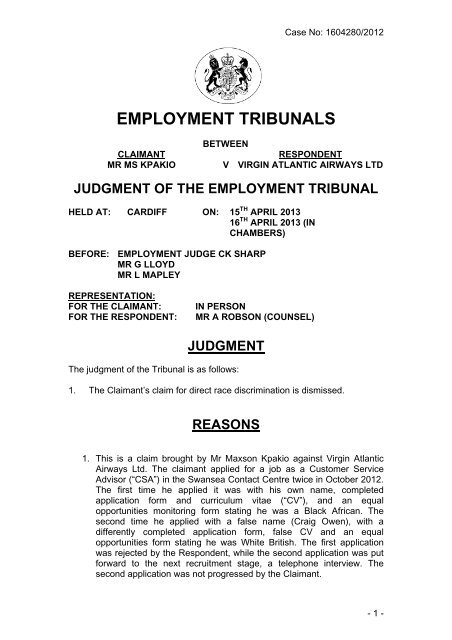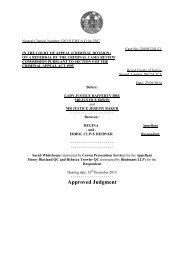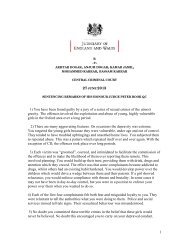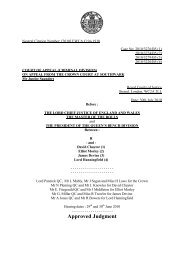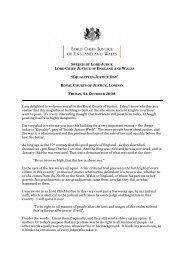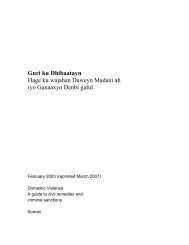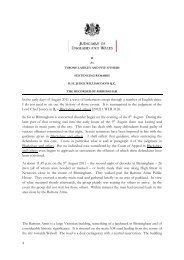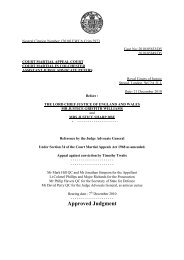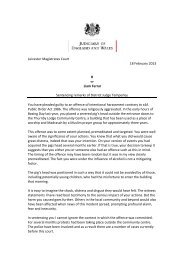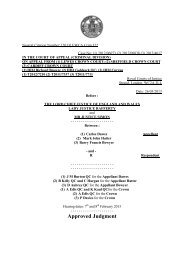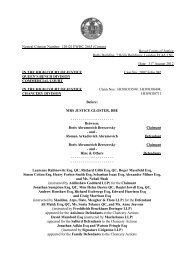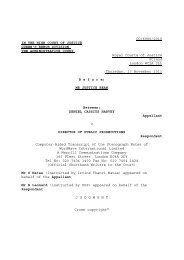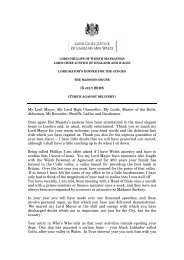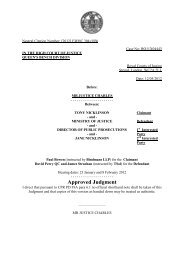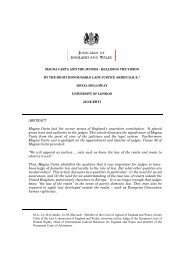Mr MS Kpakio -v- Virgin Atlantic Airways Ltd - Judiciary
Mr MS Kpakio -v- Virgin Atlantic Airways Ltd - Judiciary
Mr MS Kpakio -v- Virgin Atlantic Airways Ltd - Judiciary
You also want an ePaper? Increase the reach of your titles
YUMPU automatically turns print PDFs into web optimized ePapers that Google loves.
Case No: 1604280/2012<br />
EMPLOYMENT TRIBUNALS<br />
CLAIMANT<br />
MR <strong>MS</strong> KPAKIO<br />
BETWEEN<br />
RESPONDENT<br />
V VIRGIN ATLANTIC AIRWAYS LTD<br />
JUDGMENT OF THE EMPLOYMENT TRIBUNAL<br />
HELD AT: CARDIFF ON: 15 TH APRIL 2013<br />
16 TH APRIL 2013 (IN<br />
CHAMBERS)<br />
BEFORE: EMPLOYMENT JUDGE CK SHARP<br />
MR G LLOYD<br />
MR L MAPLEY<br />
REPRESENTATION:<br />
FOR THE CLAIMANT:<br />
FOR THE RESPONDENT:<br />
IN PERSON <br />
MR A ROBSON (COUNSEL) <br />
JUDGMENT<br />
The judgment of the Tribunal is as follows:<br />
1. The Claimant’s claim for direct race discrimination is dismissed.<br />
REASONS<br />
1. This is a claim brought by <strong>Mr</strong> Maxson <strong>Kpakio</strong> against <strong>Virgin</strong> <strong>Atlantic</strong><br />
<strong>Airways</strong> <strong>Ltd</strong>. The claimant applied for a job as a Customer Service<br />
Advisor (“CSA”) in the Swansea Contact Centre twice in October 2012.<br />
The first time he applied it was with his own name, completed<br />
application form and curriculum vitae (“CV”), and an equal<br />
opportunities monitoring form stating he was a Black African. The<br />
second time he applied with a false name (Craig Owen), with a<br />
differently completed application form, false CV and an equal<br />
opportunities form stating he was White British. The first application<br />
was rejected by the Respondent, while the second application was put<br />
forward to the next recruitment stage, a telephone interview. The<br />
second application was not progressed by the Claimant.<br />
- 1 -
Case No: 1604280/2012<br />
2. It is the case put forward by the Claimant that the above outline of<br />
events gives rise to a claim against the Respondent for direct race<br />
discrimination under s.13 of the Equality Act 2010, namely that the<br />
decision not to progress the application made under his real name was<br />
due to his ethnic origin or nationality, being originally from Liberia. He<br />
originally sought significant compensation in respect of this claim, but<br />
under cross-examination withdrew this claim. The Claimant wishes to<br />
receive a job offer from the Respondent and an apology, neither of<br />
which are in the power of this Tribunal to order if the claim is upheld,<br />
and this was explained to the Claimant during the hearing.<br />
3. At the outset of the hearing, the procedure used by the Tribunal was<br />
explained to the parties and the following issues were agreed as<br />
requiring a determination from the Tribunal:<br />
a. The claim is being brought under s.39 of the Equality Act 2010<br />
(“the Act”) by an applicant who is complaining of the<br />
Respondent’s decision not to offer employment and about the<br />
arrangements the Respondent makes for deciding to whom to<br />
offer employment, the Claimant alleging the decision not to<br />
progress his application was due to a protected characteristic.<br />
The right to bring the claim is not disputed by the Respondent,<br />
though the claim itself is disputed;<br />
b. The protected characteristic in this case is race as defined by<br />
s.9 of the Act, and in particular the national origin, nationality<br />
and/or ethnic background of the Claimant who was born in<br />
Liberia and is a Black African. The right to bring the claim is not<br />
disputed by the Respondent, though the claim itself is disputed;<br />
c. The head of discrimination alleged by the Claimant is direct race<br />
discrimination under s.13(1) of the Act, namely that the<br />
Respondent discriminated against the Claimant if due to race<br />
the Respondent treated him less favourably than the<br />
Respondent treats or would treat others. The less favourable<br />
treatment complained of is not progressing the first application<br />
by the Claimant. A comparator is not strictly required by the Act<br />
as the “reason why” test from Shamoon v Chief Constable of<br />
the Royal Ulster Constabulary 2003 ICR 337 is sufficient for<br />
the purposes of this claim (why was the Claimant’s first<br />
application rejected? Was it because of his race?), but in this<br />
case the Tribunal has been given the details of a comparator –<br />
Craig Owen. <strong>Mr</strong> Owen is not a real person, but an identity<br />
adopted by the Claimant to “test” the Respondent. The parties<br />
have agreed the above legal test must be determined by this<br />
Tribunal, but the Respondent does not challenge the description<br />
of failure to progress the application as being “less favourable<br />
treatment”. It does strongly deny the reason for the failure to<br />
progress was the Claimant’s race;<br />
d. A mere difference in ethnic origin between applicants is not<br />
sufficient to successfully bring a claim for race discrimination.<br />
Under s.136 of the Act, there is a “shifting burden of proof”. The<br />
- 2 -
Case No: 1604280/2012<br />
Claimant must show facts on the balance of probabilities from<br />
which this tribunal could find in the absence of an explanation<br />
from the Respondent that it breached the Act. If the Claimant<br />
does so, the tribunal must uphold his claim unless the<br />
Respondent can then show on the balance of probabilities that it<br />
did not breach the Act;<br />
e. If the Claimant succeeds in this claim, the tribunal must go on to<br />
consider what compensation to award for financial loss and<br />
injury to feelings, though the Claimant has now waived this<br />
element of his claim as explained in paragraph 2 above.<br />
However, the hearing spilt the issues of liability and remedy, and<br />
this judgment as a result only deals with liability.<br />
4. At the outset of the hearing, Counsel for the Respondent sought an<br />
informal confidentiality agreement in respect of Appendix 2 of <strong>Mr</strong>s<br />
Day’s witness statement. This request was dropped after an<br />
adjournment. It may also be useful to note that Counsel was later<br />
concerned that a photograph of <strong>Mr</strong>s Day giving evidence may have<br />
been taken by a member of the press in attendance, <strong>Mr</strong> Martin Shipton<br />
of the Western Mail. <strong>Mr</strong> Shipton denied taking such a photo, and the<br />
Tribunal with the consent of the Respondent left the matter there on the<br />
basis that if such a photo had been taken and was published, it would<br />
be a contempt of court, a matter in which the Attorney-General could<br />
bring proceedings against both the journalist and publication involved.<br />
Background<br />
5. The Claimant was born in Liberia and moved to the UK in 2002. He<br />
attended a “job talk” in the premises of the Respondent in its contact<br />
centre in Swansea at some point in October 2012, where he toured the<br />
premises as part of a group of 12-15 job seekers. The Respondent is a<br />
well-known airline. As a result, the Claimant decided to apply online for<br />
a role with the Respondent as a CSA in the contact centre on 6<br />
October 2012. The role was advertised and the Respondent was filling<br />
a considerable number of CSA roles. In October 2012, the Respondent<br />
was attempting to fill 2 or 3 courses to train new staff to be a CSA, a<br />
course consisting of 15 people each. It was an on-going recruitment<br />
campaign.<br />
6. The application was considered by <strong>Mr</strong>s Charlotte Day, a HR coordinator<br />
based in Crawley, Sussex, and rejected. This meant the<br />
application did not progress to the next stage, which was a telephone<br />
interview. The Claimant was notified of this on 12 th October 2012.<br />
7. The Claimant submitted a new application for the CSA online in the<br />
name of “Craig Owen” in order to “test” the Respondent in his own<br />
words. <strong>Mr</strong> Owen does not exist and is an alter ego of the Claimant. <strong>Mr</strong><br />
Owen’s application stated in the equal opportunities form that he was<br />
White British. His application was not identical to the Claimant’s and<br />
was made on or around 16 th October 2012.<br />
- 3 -
Case No: 1604280/2012<br />
8. <strong>Mr</strong> Owen’s application was considered by <strong>Mr</strong>s Sally Williams, a HR<br />
assessor based in Crawley, and was passed through to the next stage,<br />
the telephone interview. The Claimant was notified of this on 19 th<br />
October 2012.<br />
9. The Respondent’s automated recruitment system, known as “i-recruit”<br />
generated emails to <strong>Mr</strong> Owen between 19 th October and 8 November<br />
2012, noting his lack of response and asking him to book a telephone<br />
interview. There were 7 emails in total. The Claimant did not respond<br />
and after the 7 th email, the system stopped emailing <strong>Mr</strong> Owen.<br />
10. The Claimant was aggrieved that his real application had not been<br />
successful while “<strong>Mr</strong> Owen’s” had moved to the next stage. He<br />
accordingly issued this claim in the Cardiff Employment Tribunal on<br />
19 th November 2012, to which the Respondent responded on 13 th<br />
December 2012. The Claimant originally sought compensation in the<br />
region of £82,146, which he later reduced following a case<br />
management discussion to £55,888.<br />
The law<br />
11.The list of issues agreed between the parties comprehensively<br />
summarises the tests set out by sections 9, 13, 39, & 136 of the Act.<br />
There is no dispute regarding the interpretation of those sections and<br />
therefore it would be otiose to repeat the provisions again. Counsel for<br />
the Respondent drew the Tribunal’s attention to s.23 of the Act which<br />
states that when comparing a Claimant to a comparator, there must be<br />
no material difference between the two, other than not sharing the<br />
protected characteristic.<br />
12.The Tribunal heard from the Claimant in person, and <strong>Mr</strong>s Adele King,<br />
<strong>Mr</strong>s Charlotte Day and <strong>Mr</strong>s Sally Williams on behalf of the Respondent.<br />
It also read every document in the hearing bundle (though not all were<br />
referred to during the hearing). Both the Claimant and Counsel for the<br />
Respondent made oral submissions. The Tribunal do not propose to<br />
set out in detail those submissions, but adopt them in their entirety and<br />
refer to them only where they appear most relevant.<br />
Findings of fact<br />
13.It is accepted by all the parties that the Claimant has the right to bring<br />
this claim due to s.39 of the Act, and that failure to progress his<br />
application could constitute less favourable treatment. It is also<br />
accepted that the Claimant is a black African from Liberia and is<br />
protected by s.9.<br />
14. This case turns on whether the Claimant’s application was not<br />
progressed by <strong>Mr</strong>s Day because of his race. A comparison of the<br />
Claimant’s application to <strong>Mr</strong> Owen’s is required, but it is not<br />
determinative of this matter as the critical question is why <strong>Mr</strong>s Day did<br />
not progress the Claimant’s application, not why <strong>Mr</strong>s Williams<br />
progressed <strong>Mr</strong> Owen’s.<br />
- 4 -
Case No: 1604280/2012<br />
15. The Claimant says that his application and CV clearly shows that he is<br />
from Liberia. The Claimant says his name shows he is African, and that<br />
his application and CV refers to his education and experience in<br />
Liberia. The Claimant points out he completed the Equal Opportunities<br />
monitoring form to say he was a black African.<br />
16. It is a finding of this Tribunal that this is not entirely accurate. Nowhere<br />
in the application form or CV of the Claimant is there a reference<br />
specifically to Liberia or Africa. The education and experience all postdate<br />
the Claimant’s arrival in the UK in 2002. The only reference to<br />
Africa is potentially the Claimant’s name, which the Tribunal finds is not<br />
a traditional British name, and the monitoring form.<br />
17.<strong>Mr</strong>s Day’s evidence was that she did not have access to the monitoring<br />
form. The Tribunal found <strong>Mr</strong>s Day to be an honest and credible witness<br />
and accepts her evidence in this regard. <strong>Mr</strong>s Day’s evidence was that<br />
she did not recognise the name of the Claimant as African and that she<br />
did not recall reading it. <strong>Mr</strong>s Day explained she had 5 minutes per<br />
application to consider the application form and CV and decide whether<br />
the essential criteria of the role were met. <strong>Mr</strong>s Day, and her colleagues<br />
<strong>Mr</strong>s Williams and <strong>Mr</strong>s King, all confirmed there were approximately<br />
1200 applications and that the team had little time to reflect on<br />
applications. Their evidence was that they looked at the answers to the<br />
questions and the CV, and that was all. The Tribunal accepts this<br />
evidence.<br />
18.The Claimant went on to argue that he clearly was an excellent<br />
candidate for this role. The Claimant pointed to his degree in<br />
International Relations from Swansea University, and his extensive<br />
volunteering work, including counselling victims at Victim Support and<br />
his experience with the Red Cross. His application form referred to<br />
being able to use the internet. Under cross-examination, the Claimant<br />
went on to explain his work as a student representative on the Faculty<br />
Board at university. He also stated that the reason given by the<br />
Respondent for preferring <strong>Mr</strong> Owen was unconvincing as <strong>Mr</strong> Owen<br />
alleged he worked at the check-out of a supermarket, which in the<br />
Claimant’s view was not customer service, but merely stacking<br />
shelves. He stated that people on check-outs do not speak to<br />
customers, while as a counsellor he had extensive experience of<br />
customer service. The Claimant also stated in his submissions that he<br />
noticed on his tour of the Respondent’s premises there was no-one<br />
who looked like him, and thus he had a good chance of getting the role<br />
as there were quotas for ethnic minorities.<br />
19. The Claimant’s CV and application form set out his volunteering work,<br />
but did not disclose his work as a student representative. There was no<br />
reference to formal customer service work in a retail environment, and<br />
only made a passing reference to the Internet. It did refer to a threemonth<br />
stint in a call centre in the form, but not the CV. <strong>Mr</strong>s Day’s<br />
evidence was that if the experience was not in the CV, it would be<br />
ignored as she did not have time to “play detective”. She also gave<br />
evidence that once a candidate showed they had an education of<br />
- 5 -
Case No: 1604280/2012<br />
GCSE standard, no additional points were given for a university<br />
education.<br />
20. The job advertisement stated clearly that previous experience in<br />
customer service was essential. The Tribunal cannot substitute its view<br />
of the value of volunteering for that of an employer. The evidence from<br />
the Respondent’s witnesses was that volunteering was not the same<br />
as formal customer service expertise, and the Respondent wanted<br />
individuals who had experience in a retail environment. Counselling<br />
was not the same as there were no sales targets to meet. <strong>Mr</strong>s Williams<br />
expressed the view nicely as “delivering great customer service” while<br />
selling the product. It is a finding of the Tribunal that the Claimant did<br />
not have such experience. It is also a finding of the Tribunal that saying<br />
you can use the Internet does not mean you can use “live chat”, an<br />
issue the Tribunal will deal with later in this judgment.<br />
21. It is a finding of the Tribunal that the Claimant’s application and CV did<br />
not meet the published criteria for the job. However, the Tribunal went<br />
on to compare the differences between the Claimant’s application and<br />
<strong>Mr</strong> Owen. <strong>Mr</strong> Owen’s application and CV was very different to the<br />
Claimant’s; it was not a case of simply changing the name and<br />
ethnicity. <strong>Mr</strong> Owen’s degree and dates in university were different to<br />
the Claimant’s. Much more critically, <strong>Mr</strong> Owen specifically mentioned<br />
he had experience of live chat, and 5 years of working in customer<br />
service in a retail environment. In the judgment of the Tribunal, the<br />
Claimant tailored this application and CV specifically to attract the<br />
Respondent’s attention. The Claimant never adequately explained why<br />
he changed the application and CV so radically, or why <strong>Mr</strong> Owen’s<br />
application mentioned “live chat”.<br />
22.The evidence of <strong>Mr</strong>s Williams was that it was unusual for candidates to<br />
mention “live chat”. “Live chat” is a system of instant messaging<br />
between customers and retailers to enable customers to ask a question<br />
and receive a near-instantaneous response. Examples of “live chat”<br />
were in the bundle, and it was not disputed that “live chat” formed a key<br />
part of the CSA role.<br />
23.The Claimant’s “test” was certainly not one that would meet the<br />
requirements of scientific rigour. His application was not the same as<br />
<strong>Mr</strong> Owen. The evidence of the Respondent’s witnesses was that due to<br />
the mention of “live chat” and the significant customer service<br />
experience, <strong>Mr</strong> Owen’s application was worth progressing to the next<br />
stage, and the Tribunal accepts that evidence. The requirements of<br />
s.23 is that there must be no material difference between the<br />
comparators, and the Tribunal finds that there were significant<br />
differences between the two applications for the reasons set out by the<br />
Respondent. There was a clear business reason why <strong>Mr</strong> Owen was<br />
progressed and the Claimant was not.<br />
24.The Claimant alleges the automated emails from the Respondent show<br />
it preferred white British candidates. The Tribunal is not persuaded by<br />
the contention. The Tribunal finds that the emails would have been<br />
- 6 -
Case No: 1604280/2012<br />
sent to any candidate who was progressed to the telephone interview<br />
stage. They were automatically sent to non-responding candidates.<br />
25.The Tribunal considered carefully whether or not the Claimant had<br />
satisfied the first stage of the shifting burden of proof, namely that he<br />
had shown facts (on the balance of probabilities) from which, in the<br />
absence of an explanation from the Respondent, the Tribunal could<br />
find he had suffered direct race discrimination. In the judgment of the<br />
Tribunal, the Claimant has failed to do so. His witness statement<br />
contained untruths, such as he had set out his Liberian education and<br />
experience in his application to the Respondent, and he gave evasive<br />
answers under cross-examination. The Claimant’s statement claimed<br />
he had been told he did not need experience at the job talk, but the<br />
Tribunal prefers the evidence of the advertisement which clearly stated<br />
customer service experience is required. More critically, the two<br />
applications were not the same or even similar. <strong>Mr</strong> Owen said he had<br />
experience of “live chat” and significant customer service experience in<br />
a retail environment. The Claimant did not. The Tribunal wishes to be<br />
absolutely clear given the press coverage in the hearing bundle that<br />
the Claimant did not merely change the names and ethnicity in the two<br />
applications; they were different applications and the false application<br />
was clearly designed to meet the Respondent’s criteria for the role.<br />
26.If the Tribunal is incorrect in saying that the Claimant fails to satisfy the<br />
first stage of the shifting burden of proof, given it is an artificial<br />
construct, it went on to consider the explanations given by the<br />
Respondent. Given the findings of fact in this case, the Tribunal finds<br />
that <strong>Mr</strong>s Day did not reject the Claimant’s application because of his<br />
race, but because of the reasons set out in her witness statement. The<br />
Claimant’s application failed to meet the criteria stated in the<br />
advertisement of the role, namely customer service experience and PC<br />
literate. Simply stating you use the internet is not enough information.<br />
<strong>Mr</strong>s Day did not behave in a racially discriminatory matter towards the<br />
Claimant. The Tribunal is satisfied that the Respondent has given a<br />
fully adequate explanation for its decision, and it was nothing to do with<br />
the Claimant’s protected characteristic (Laing v Manchester City<br />
Council 2006 ICR 1519).<br />
27. The Tribunal dismisses the Claimant’s claim for race discrimination.<br />
The Claimant’s race played no part in the decision not to progress his<br />
application in the judgment of this Tribunal.<br />
Judgment posted to the parties on<br />
……………………………………….<br />
……………………………………….<br />
EMPLOYMENT JUDGE CK SHARP<br />
For Secretary of the Tribunals Dated: April 2013<br />
- 7 -


